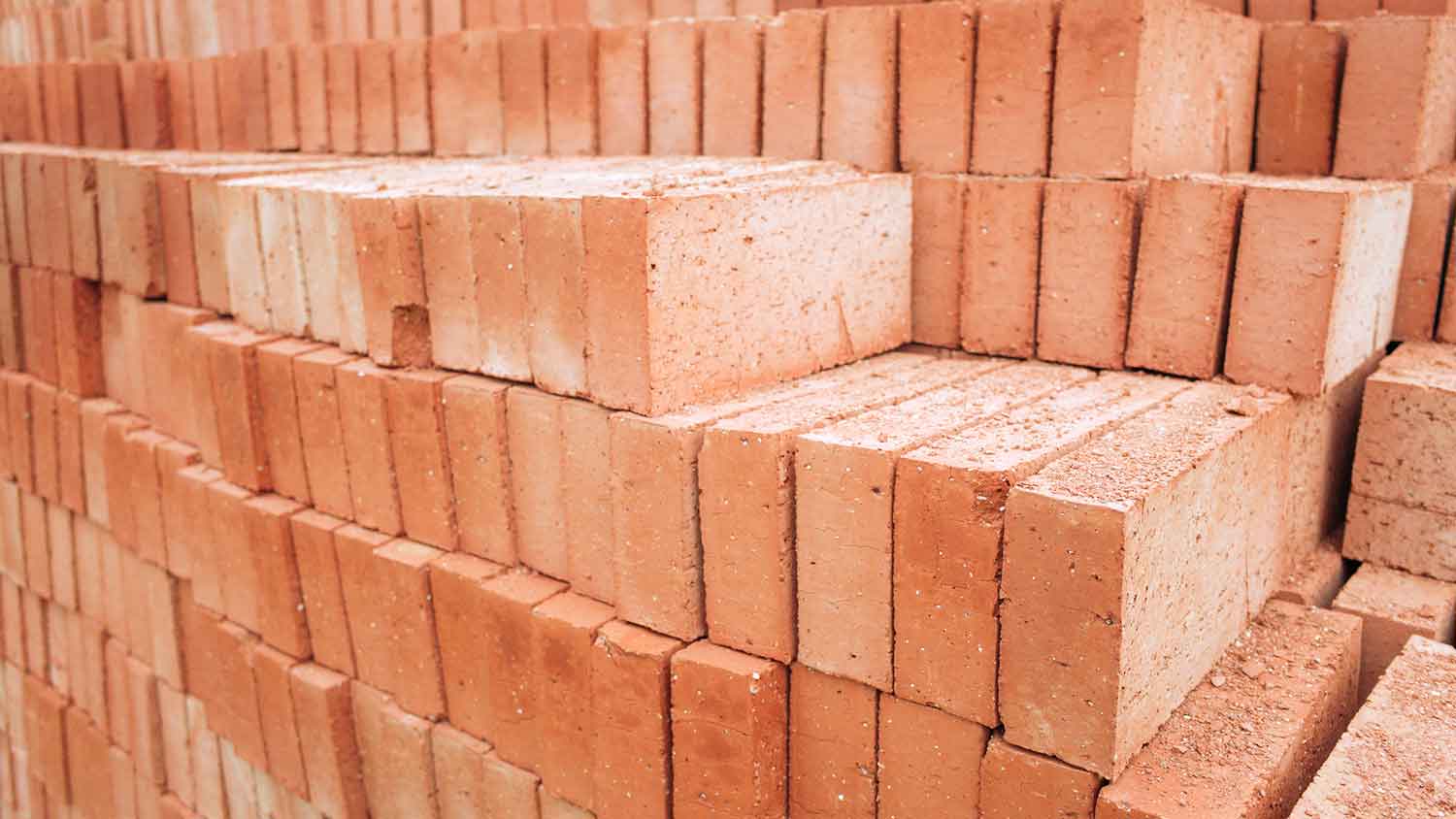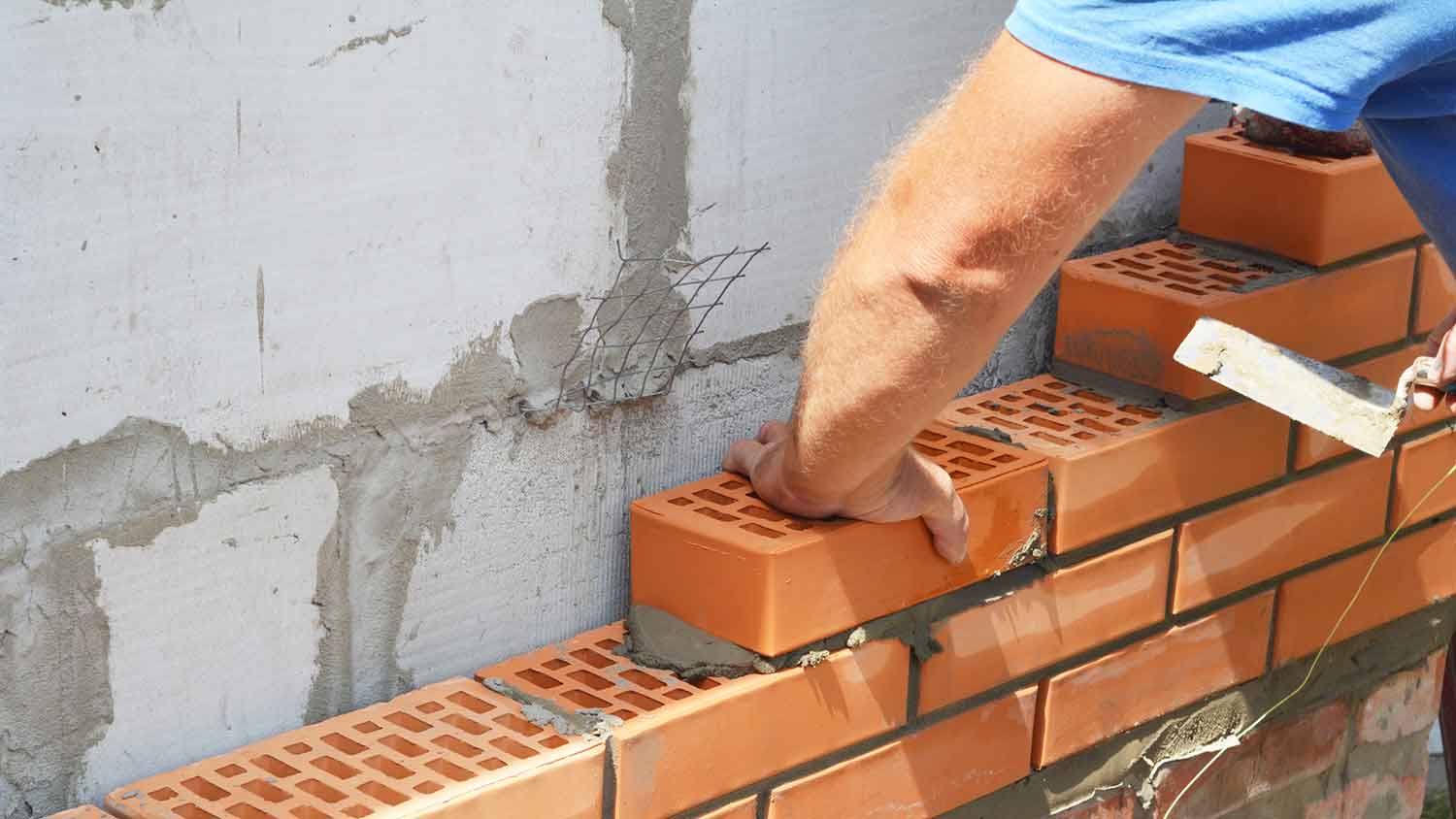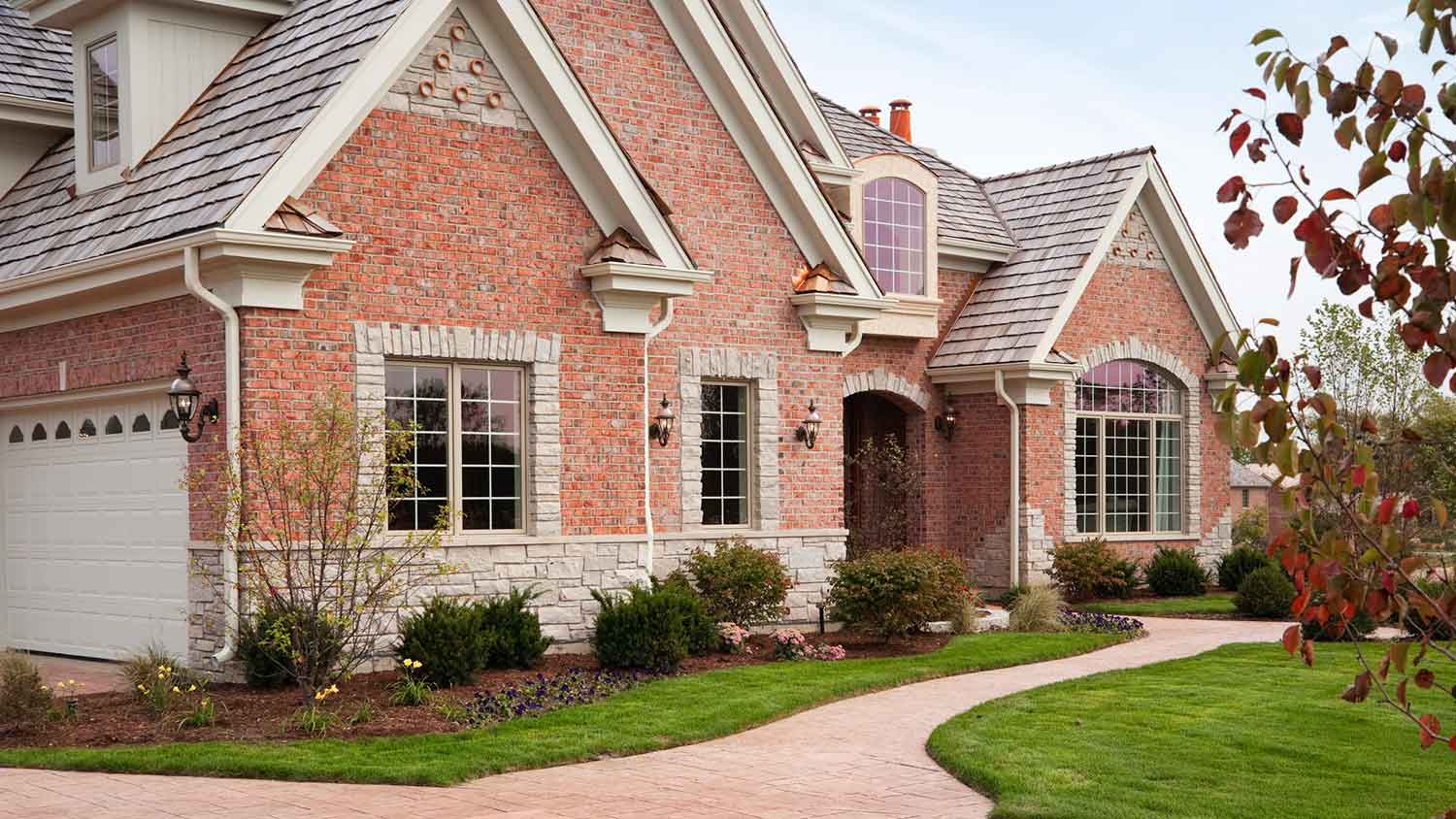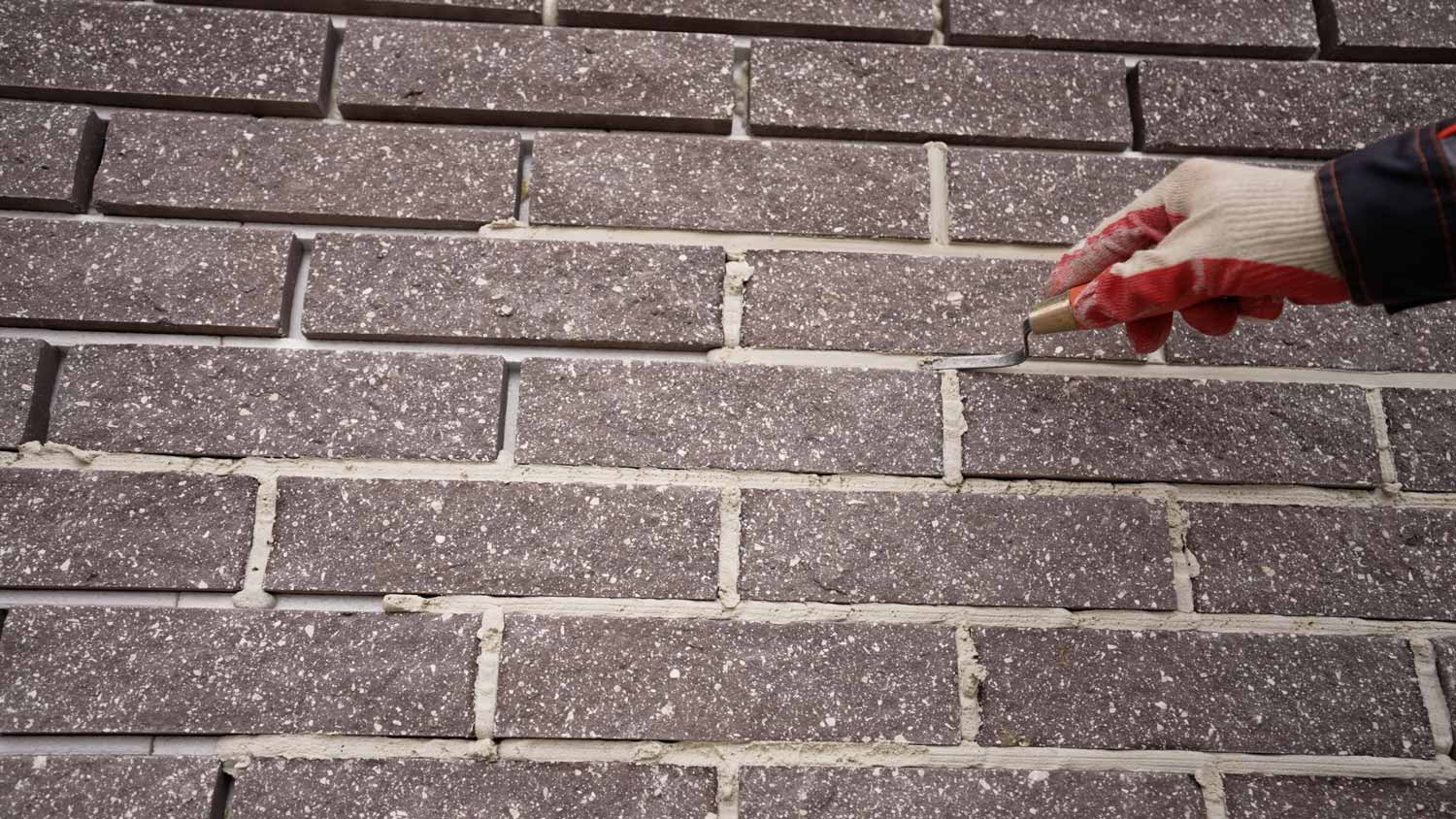
The cost to brick a house depends on several factors, like labor costs, home size, and brick types. Use our guide to estimate your bricking costs.
While the average cost of a single brick is $0.67, it can range between $0.35 and $1.20 based on everything from brick quality to whether you're buying in bulk.


A single brick costs $0.35 to $1.20 on average.
In general, bricks for major projects are sold in pallet sizes that are determined by the square footage of your project.
A square foot of bricks costs $2 to $8 on average.
While a single brick costs $0.67 on average, most homeowners pay between $0.51 and $0.83. Factors that influence the cost include the type of brick you choose, the number of bricks you need, and whether you choose DIY brick installation or hire a pro.

With so many different types of brick available for so many different projects, costs for brick vary widely.
| Brick Type | Description | Cost |
|---|---|---|
| Red brick | Solid brick with rough surface | $0.35–$1.20 |
| Face brick | Weatherproof brick for exposed area | $0.40–$0.90 |
| Engineering brick | Weather-resistant for foundations and reinforced walls | $0.40–$0.85 |
| Cement brick | Solid concrete for retaining walls and waterproofing | $0.50–$0.80 |
| Glazed brick | Weatherproof and decorative | $2.50–$7 |
| Bullnose brick | Rounded-edge bricks for capping walls, corners, and sills | $1.75–$3 |
| Fire brick | For fireplaces or fire pits | $2–$3 |
| Thin brick | Water-resistant veneers | $0.75–$1.85 |
| Adobe | Mud-based bricks for Southwestern-style homes | $2–$5 |
| Brick Quantity | Average Cost |
|---|---|
| Single brick | $0.35–$1 |
| 1 square foot of bricks | $2–$8 |
| Pallet of bricks (400-550 bricks ) | $150–$500 |
| 1,000 bricks | $350–$1,200 |
On average, labor costs for installing brick range from $50 to $125 per hour. If a masonry contractor charges by square foot, the rate may range from $10 to $45 per square foot based on the complexity of the project. Common costs for specific brick projects include:
Rebricking a house: $10,000–$75,000
Building a brick mailbox: $600–$1,500
Brick fire pit installation: $300–$1,400
Building a brick wall: $3,500–$7,000
How much does a pallet of bricks cost to be delivered? On average, brick delivery costs between $50 and $250 for a residential project. Delivery distances are usually capped at a 20-mile to 50-mile radius before additional delivery charges are tacked on. Buyers are also generally charged a refundable pallet deposit fee of $10 to $30 by the supplier. Delivery size can be determined using the following:
100 square feet: 600-800 bricks
200 square feet: 1,200-1,500 bricks
300 square feet: 1,600-1,700 bricks
400 square feet: 1,800-2,000 bricks
500 square feet: 2,200-2,500 bricks
600 square feet: 2,800-3,000 bricks
700 square feet: 3,500-4,000 bricks
800 square feet: 4,300-5,000 bricks
900 square feet: 5,000-7,00 bricks
1,000 square feet: 8,000-10,000 bricks
These extras can increase costs for any brick project.
If existing bricks need to be removed, the cost for professional removal can range from $2 to $6 per square foot. On average, hauling costs are $45 to $65 per ton.
While brick maintenance is minimal, there may come a time when sealing or repointing will be needed. On average, sealing brick can cost $2 to $10 per square foot. The average cost for brick repointing is $1,450.
While brick is a durable choice that lasts decades, wear and tear or environmental factors could cause it to be damaged. The average brick repair to address chipping or flaking costs $20 to $40. For more serious foundational repairs that fix structural cracks, costs can top $1,000.

Homeowners who choose DIY brickwork can save between $0.30 and $1.50 per square foot. In general, masonry installations involving brick should be handled by licensed contractors. Improper brick installation can lead to structural issues and water damage. Experienced local masonry experts near you can complete work according to local code requirements and environmental rules. In addition, sourcing and transporting large brick orders can be unrealistic for the average homeowner who does not have access to a commercial truck.
If you're wondering if it's a more cost-effective choice to repair or replace existing brick at your home, the current age and state of the brick are the core determining factors.
| Factor | Repair | Replace |
|---|---|---|
| Cracked mortar | Repair is less than 50% of replacement cost | Repair is more than 50% of replacement cost |
| Superficial cracks | Brick is less than 30 years old | Brick is between 40 and 80 years old |
| Bricks are unstable | Work is under warranty | Warranty has expired |
| Drainage issues | Clogged weep holes | Insufficient drainage cavity |
To save on brick costs for your upcoming project, be sure to order appropriate bricks. Trying to return bricks that aren't the right size or type for a project can result in restocking fees. In addition, it's wise to order 15% more bricks than necessary. It's common for a certain number of bricks to be damaged or unusable. In addition, bricks can be broken or damaged during installation. Having that buffer of extra bricks will ensure you don't have to pay new delivery fees or commit to an order minimum just to get the bricks you need. Of course, any excess bricks left over at the end of the project can be used for garden borders or paths around your yard.
From average costs to expert advice, get all the answers you need to get your job done.

The cost to brick a house depends on several factors, like labor costs, home size, and brick types. Use our guide to estimate your bricking costs.

Need to repoint brick in your home to make your home look fresh and new? Use this guide to repointing brick cost to price out your project before starting.

The cost to replace brick front steps depends on the type of brick, square footage, pattern, and more. Learn how much you may spend on this project.

Discover what cobblestone is, its types, history, and the unique process of making this enduring and charming paving material.

Sealing brick typically isn’t necessary, but that’s not always the case. Explore the pros and cons of sealing brick walls to see if this project is right for you.

Fixing brick mortar is easier than most homeowners think. Use this guide to walk you through getting the job done with a few dollars and a few hours.